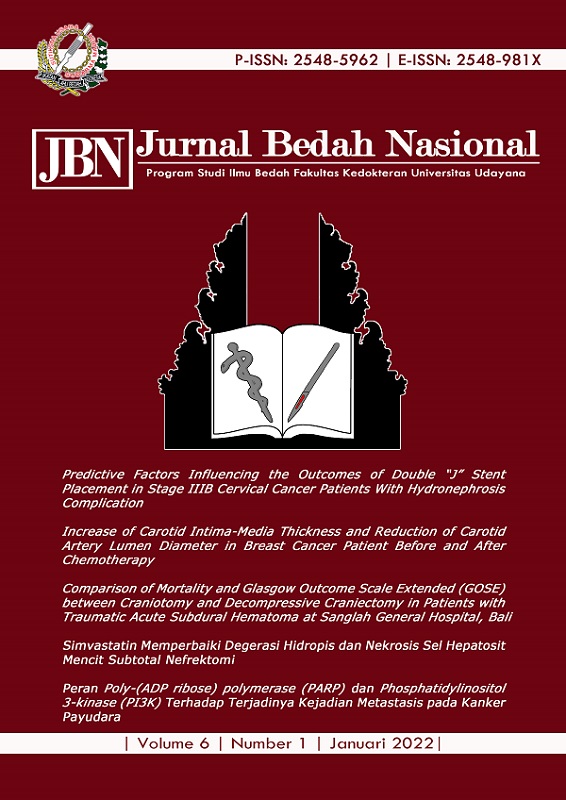Peran Poly-(ADP ribose) polymerase (PARP) dan Phosphatidylinositol 3-kinase (PI3K) Terhadap Terjadinya Kejadian Metastasis pada Kanker Payudara
Abstract
Kanker payudara merupakan penyebab kematian akibat kanker terbanyak pada wanita di seluruh dunia dengan angka kematian sebesar 458.400 wanita setiap tahunnya. Poly-(ADP ribose) polymerase (PARP) dan phosphatidylinositol 3-kinase (PI3K) adalah dua molekul yang memainkan peran penting pada patofisiologi kanker payudara. Metastasis kanker payudara merupakan sebuah proses berkesinambungan yang melibatkan beberapa tahapan penting seperti invasi, angiogenesis, hingga replikasi sel. Sel yang mengalami mutasi pada kanker payudara akan menyebabkan ekspresi yang berlebihan dari PI3K sehingga terjadi replikasi sel yang tidak terkontrol disertai dengan peningkatan matrix metallopeptidase 9 (MMP-9). MMP-9 memiliki peran dalam degradasi matriks ekstraseluler yang penting untuk proses invasi tumor. Di sisi lain, PARP membantu reparasi sel yang mengalami kerusakan sehingga proses replikasi sel kanker dapat terus berlangsung. Terlebih lagi, PARP diketahui memiliki andil besar dalam proses angiogenesis sel kanker. Gabungan dari kedua fenomena tersebut menghasilkan sel kanker dengan kemampuan replikasi dan metastasis yang tinggi.
Downloads
References
2. Cortesi L, Rugo HS, Jackisch C. An Overview of PARP Inhibitors for the Treatment of Breast Cancer. Target Oncol. 2021;16:255-82.
3. Zimmer AS, Gillard M, Lipkowitz S, dkk. Update on PARP Inhibitors in Breast Cancer. Curr Treat Options Oncol. 2018;19:1-19.
4. Ellis H, Ma CX. PI3K Inhibitors in Breast Cancer Therapy. Curr Oncol Rep. 2019;21:110.
5. Kummar S, Wade JL, Oza AM, dkk. Randomized phase II trial of cyclophosphamide and the oral poly (ADP-ribose) polymerase inhibitor veliparib in patients with recurrent, advanced triple-negative breast cancer. Invest New Drugs. 2016;34:355-63.
6. Stacker SA, Williams SP, Karnezis T, dkk. Lymphangiogenesis and lymphatic vessel remodelling in cancer. Nat Rev Cancer. 2014;14:159-72.
7. Christiansen A, Detmar M. Lymphangiogenesis and cancer. Genes Cancer. 2011;2:1146-58.
8. Karaman S, Detmar M. Mechanisms of lymphatic metastasis. J Clin Invest. 2014;124:922-8.
9. Peralta-Leal A, Rodríguez MI, Oliver FJ. Poly(ADP-ribose)polymerase-1 (PARP-1) in carcinogenesis: potential role of PARP inhibitors in cancer treatment. Clin Transl Oncol. 2008;10:318-23.
10. Sehouli J, Braicu EI, Chekerov R. PARP Inhibitors for Recurrent Ovarian Carcinoma: Current Treatment Options and Future Perspectives. Geburtshilfe Frauenheilkd. 2016;76:164-9.
11. Cortesi L, Rugo HS, Jackisch C. An Overview of PARP Inhibitors for the Treatment of Breast Cancer. Target Oncol. 2021;16:255-82.
12. Lehmann BD, Pietenpol JA. Identification and use of biomarkers in treatment strategies for triple-negative breast cancer subtypes. J Pathol. 2014;232:142-50.
13. Bianchini G, Balko JM, Mayer IA, Sanders ME, Gianni L. Triple-negative breast cancer: challenges and opportunities of a heterogeneous disease. Nat Rev Clin Oncol. 2016;13:674-90.
14. Annunziata CM, Bates SE. PARP inhibitors in BRCA1/BRCA2 germline mutation carriers with ovarian and breast cancer. F1000 Biol Rep. 2010;2:.
15. Dziadkowiec KN, Gasiorowska E, Nowak-Markwitz E, dkk. PARP inhibitors: review of mechanisms of action and BRCA1/2 mutation targeting. Prz Menopauzalny. 2016;15:215-9.
16. Martin-Oliva D, Aguilar-Quesada R, O’valle F, dkk. Inhibition of poly(ADP-ribose) polymerase modulates tumor-related gene expression, including hypoxia-inducible factor-1 activation, during skin carcinogenesis. Cancer Res. 2006;66:5744-56.
17. Pouysségur J, Dayan F, Mazure NM. Hypoxia signalling in cancer and approaches to enforce tumour regression. Nature. 2006;441:437-43.
18. Guerrero-Zotano A, Mayer IA, Arteaga CL. PI3K/AKT/mTOR: role in breast cancer progression, drug resistance, and treatment. Cancer Metastasis Rev. 2016;35:515-24.
19. Ortega MA, Fraile-Martínez O, Asúnsolo Á, dkk. Signal Transduction Pathways in Breast Cancer: The Important Role of PI3K/Akt/mTOR. J Oncol. 2020;2020:9258396.
20. Ciriello G, Gatza ML, Beck AH, dkk. Comprehensive Molecular Portraits of Invasive Lobular Breast Cancer. Cell. 2015;163:506-19.
21. Wu X, Sun L, Wang X, dkk. Breast Cancer Invasion and Metastasis by mPRα Through the PI3K/Akt Signaling Pathway. Pathol Oncol Res. 2016;22:471-6.

This work is licensed under a Creative Commons Attribution 4.0 International License.
Program Studi Ilmu Bedah Fakultas Kedokteran Universitas Udayana. 
This work is licensed under a Creative Commons Attribution 4.0 International License.






